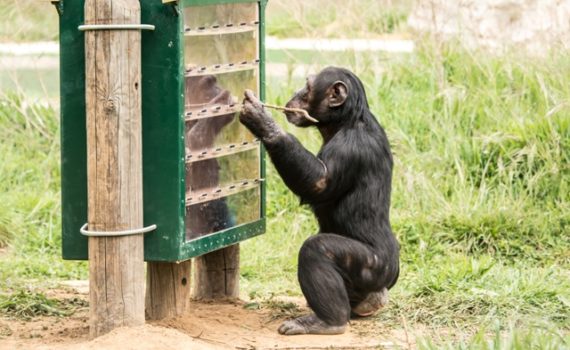
Games for Chimpanzees #MonaMaze
Environmental enrichment is a fundamental tool to guarantee a good quality of life for animals living in captivity. The objective is to provide them with activities that promote species specific behaviors, but does this mean that only natural objects or tasks can be used?
Our chimpanzees have artificial termite mounds that we load with tubes with honey or peanut butter mixed with cereals. Although they do not fish for termites, they have to use a technique similar to that used in the jungle: the use of tools. In order to get to the bottom of the holes they have to choose, and often modify, something of appropriate size and strength from among the vegetation.
These artificial termite mounds promote an activity observed within the normal behavioral repertoire of chimpanzees. But what happens if we build a maze in which they have to make nuts move in the correct direction, with the help of tools, to extract them? Well, apart from the use of basic tools, spatial reasoning must be put to work.
Studies indicate that when carried out in a controlled manner and when animals can choose whether to participate or not, the impact on their welfare is positive. Although wild chimpanzees do not have devices like these, we can not forget that they are animals with a great cognitive capacity and that their brains are designed to solve complex problems and situations. In captivity chimpanzees face many fewer challenges, so it is positive and necessary for them to have access to stimulating activities that allow them to put their skills into practice and ultimately improve their well-being.
* Maze built in the framework of the project EMCOBA: “On the interaction of emotion, cognition and welfare: comparative and evolutionary views in chimpanzees and humans”. It’s part of the doctoral thesis “Cognitive challenges in captive chimpanzees: welfare implications and influence of personality”, by M. Padrell. With the support of
![]()






